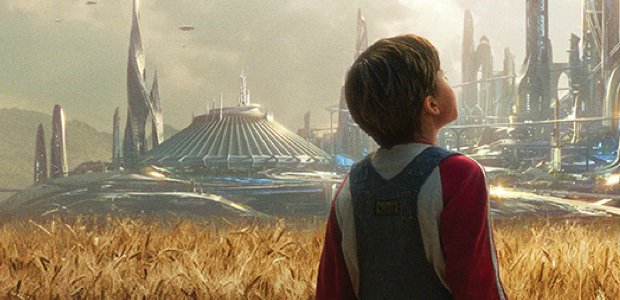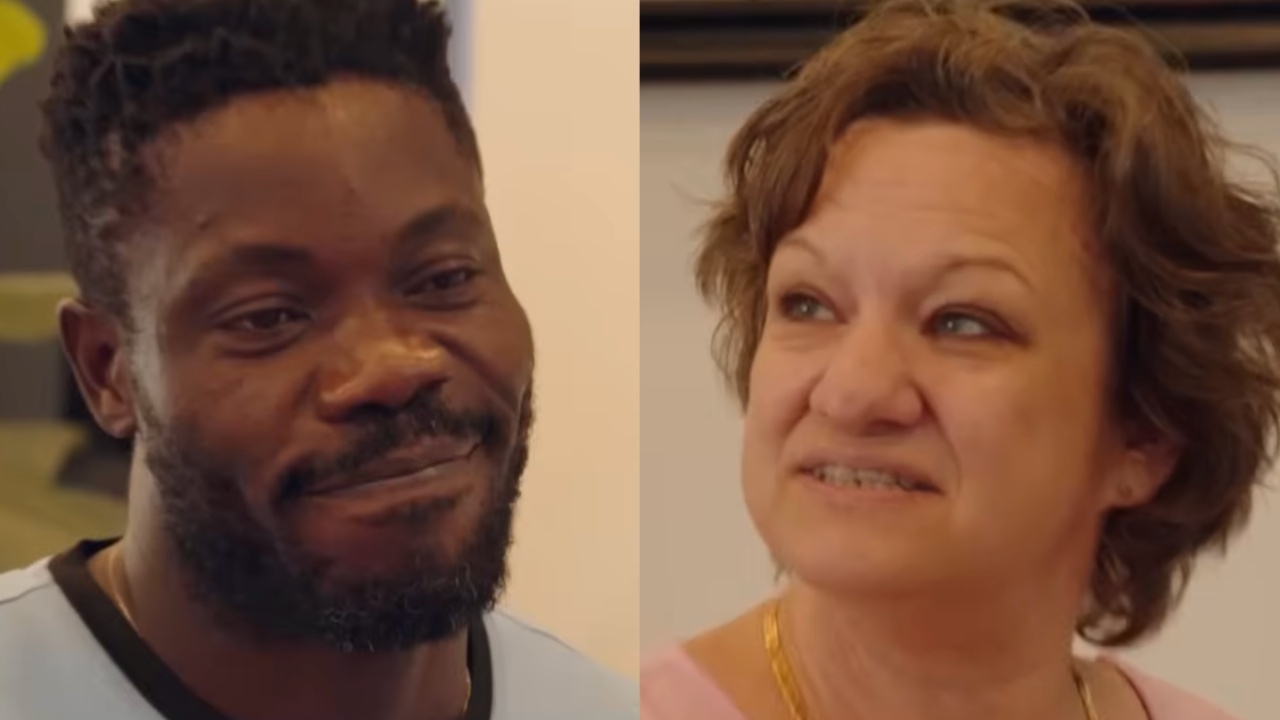In an early scene in Brad Bird’s Tomorrowland, a young version of George Clooney’s character, Frank, arrives at the 1964 World’s Fair carrying a heavy, awkwardly shaped duffle bag, and tries to enter a hosted contest for inventors. Standing before a judge, played by Hugh Laurie, he opens his bag and puts together his creation: a non-functioning jetpack. The judge explains that it’s not really an invention if it doesn’t actually work, but the young Frank argues that he not only deserves credit for the idea, but also the potential inspiration he believes it could deliver.
While presumably unintentional, this scene actually serves as a pretty perfect metaphor for the entire film, which floats on amazing presentation and optimism, but doesn’t also entirely function properly. It’s a movie that you very much want to like, as its core message preaches the necessity for hope and positivity to outweigh despair and capitulation. But it does so with a very uneven storyline, and a notable lack of clarity in key moments.
In the run-up to its theatrical release, Tomorrowland has been notable for the amount of secrecy and mystery that surrounds its story, but while this has been sold as a marketing strategy, the reality is that it’s just a reflection of the film’s structure, which really pushes all of the real plot to the back-end of the runtime. The majority of the movie really feels like set-up, featuring the adventures of a smart young girl named Casey (Britt Robertson), who discovers the world of Tomorrowland and becomes obsessed with the idea of finding a way to get there (with no real specific interests beyond just exploring more of it). Helping her along the way is Athena (Raffey Cassidy), an android who looks like a young girl, and the aforementioned Frank (Clooney), who has grown into a bitter old man. But even while they have their own motivations for getting to the futuristic paradise, details are kept extremely vague, and it never feels like the narrative is building. Simply too much of the movie is dominated by the journey to arrive at the plot, and while that road includes events like a fun fight scene in a toy shop and a robot attack at Frank’s house, by the time Tomorrowland is over and you can view it from a macro perspective, it’s hard not to feel underwhelmed by its totality.
These legitimately problematic script issues would have tanked the film if they had been paired with a group of under-developed, unlikable characters, but this is actually where the movie finds legitimate balance. It’s surprisingly refreshing to see a family film that is driven by its young actors, and it’s primarily their performances that keep the audience engaged. Casey’s driving personality trait is her unwillingness to give up the future and a desire to change things for the better, and Robertson fuels that with her personal charisma and a sense of wonder that can be appreciated by even the most cynical audiences. And while it is nice to see Clooney try the challenge of a supporting role – and do well at it – the honest spotlight stealer is Raffey Cassidy. Not only is the Athena character an imaginatively-crafted, fun take on a cinematic robot, but Cassidy plays the challenging role to perfection. (It’s one thing to play a robot, but another to play a robot that looks like a child but has the intellect of an adult.)
Taking on his second live-action feature effort, Brad Bird has once again created a visual splendor in Tomorrowland… but that, too, feels hampered by the script the director co-wrote with Damon Lindelof. It should go without saying that the greatest wonder that the film has to offer is the vision of Tomorrowland, and it is really a sight to behold – filled with functioning jetpacks, futuristic architecture, diving pools that float in mid-air and more. The most impressive shot in the movie is what looks like a long, single take that maps out the expansive world and everything it has to offer.
As you might be able to tell from the plot description and the key issues with the movie, however, you can probably guess the big issue: we simply don’t see enough of it. Bird does what he can to try and balance this out, crafting set pieces like the aforementioned tech-filled home invasion and a rocket launch in Paris. Ultimately, I was left wanting to see more of what the title promises.
Tomorrowland’s positivity and fun action makes sure that at the very least audiences will be entertained, and the message of the movie is admirable and well-woven in. But as a film, it is taken down by its messiness. It all averages down to the movie being adequate, though with the names and potential of the premise, it is underwhelming.
Your Daily Blend of Entertainment News

Eric Eisenberg is the Assistant Managing Editor at CinemaBlend. After graduating Boston University and earning a bachelor’s degree in journalism, he took a part-time job as a staff writer for CinemaBlend, and after six months was offered the opportunity to move to Los Angeles and take on a newly created West Coast Editor position. Over a decade later, he's continuing to advance his interests and expertise. In addition to conducting filmmaker interviews and contributing to the news and feature content of the site, Eric also oversees the Movie Reviews section, writes the the weekend box office report (published Sundays), and is the site's resident Stephen King expert. He has two King-related columns.

